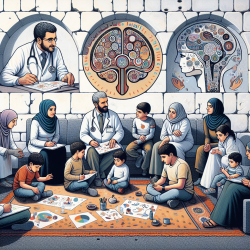The landscape of mental health interventions has evolved significantly, especially in contexts affected by conflict and displacement. The study titled Nurturing families: A feasibility randomised controlled trial of a whole-family intervention with vulnerable families in Jordan offers valuable insights into the effectiveness of a whole-family approach to mental health and psychosocial support.
The Importance of Family-Centric Approaches
Family environments play a crucial role in the development and well-being of children and adolescents. However, in settings marked by armed conflict and forced displacement, these nurturing environments are often disrupted. The study conducted in Jordan highlights the potential of whole-family interventions to address these challenges effectively.
Key Findings from the Study
- High Engagement: The intervention demonstrated high participant engagement and facilitator competence, indicating its feasibility and acceptability.
- Improvement in Family Dynamics: Significant improvements were observed in family functioning and parenting practices among participating families.
- Mental Health Benefits: Caregivers reported reduced psychological distress, showcasing the intervention's impact on mental health.
- Cultural Relevance: The intervention was well-received due to its cultural and contextual adaptability, making it suitable for diverse populations.
Implementing Whole-Family Interventions in Practice
The success of the Nurturing Families intervention provides a blueprint for practitioners looking to implement similar strategies. Here are some steps to consider:
- Cultural Adaptation: Tailor interventions to fit the cultural context of the families you work with. This ensures relevance and increases engagement.
- Community Involvement: Engage community members in outreach efforts to build trust and facilitate participation.
- Sustainability through Training: Train non-specialist facilitators to deliver interventions, enhancing scalability and sustainability.
- Holistic Approach: Address multiple psychosocial challenges within the family system to improve overall well-being.
The Role of Practitioners
The role of practitioners is pivotal in adapting and implementing these interventions. Here are ways you can enhance your skills:
- Pursue Continuous Learning: Attend workshops and webinars to stay updated on the latest research and methodologies in family interventions.
- Create Collaborative Networks: Build partnerships with local organizations and experts to share resources and knowledge.
- Elicit Feedback: Regularly gather feedback from participants to refine and improve intervention strategies.
The Path Forward
The findings from this study underscore the potential of whole-family interventions in improving mental health outcomes for vulnerable populations. As practitioners, embracing these insights can lead to more effective support systems for families facing adversity. The journey towards holistic care requires dedication, adaptability, and a commitment to continuous improvement.
If you're interested in exploring this topic further or implementing similar approaches in your practice, consider conducting additional research or collaborating with experts in the field. To read the original research paper, please follow this link: Nurturing families: A feasibility randomised controlled trial of a whole-family intervention with vulnerable families in Jordan.










